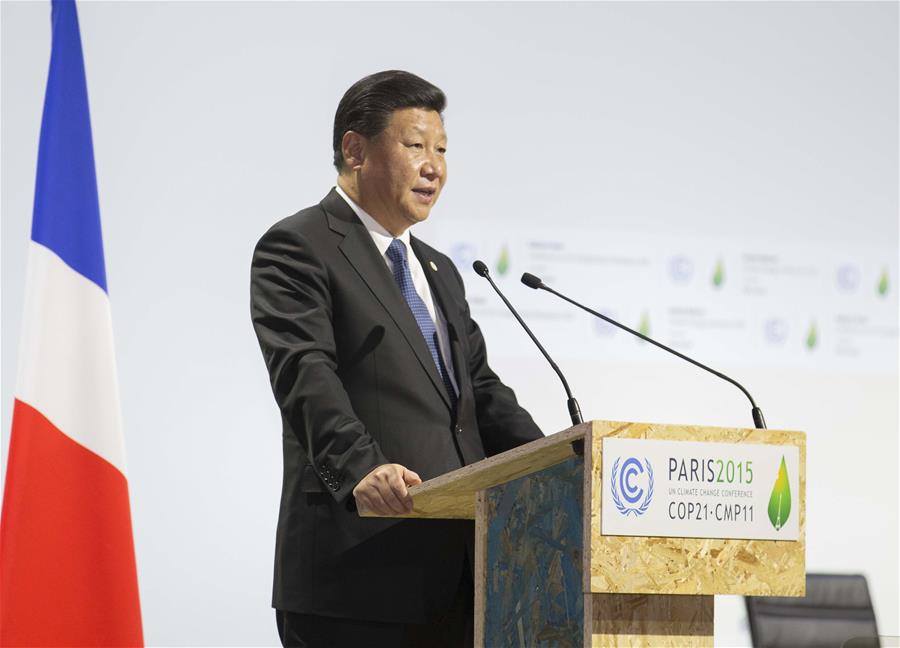

 |
| Chinese President Xi Jinping delivers a speech at the opening ceremony of the United Nations (UN) climate change conference in Paris, France, Nov. 30, 2015. (Xinhua/Huang Jingwen) |
The principle of a “common but differentiated responsibility” should be highlighted in the upcoming UN Climate Change Conference in Paris in December, a stand that China has insisted on, said a commentary by Xie Zhenhua, China's special representative for climate change.
“Addressing climate change is in the core interests and benefit of all nations, and also an issue that is closely related to each country’s global impact, thus the actions and interactions from different countries are intense, Xie wrote in a recent People’s Daily article.
Conflict and divergence still exist on how to realize common yet differentiated responsibilities, such as how to fairly allocate each country’s share of capital and technological support and reach an agreement that is legally binding globally, wrote Xie.
Taking the excuse of a changed global economic order, some developed countries have proposed a new system whereby developing and developed countries shall make joint investments in reducing carbon emissions after 2020, a move that Xie said is aimed at safeguarding their own interests.
Xie pointed out the new system has blurred the responsibilities that developed and developing countries should shoulder and the system also fails to take into account the different capabilities of countries to tackle carbon emissions.
The ambiguous approach to historical responsibilities and differentiating present capabilities in tackling climate change would damage the existing international solidarity to combat the threat and should be avoided, wrote Xie.
Xie also said existing disputes in the practice of emissions reduction affect the agreement.
As some countries push for a sweeping and legally binding agreement for all countries to realize strict emissions reductions, other nations are seeking more tolerant and flexible reduction standards in which countries can decide on their own level of contributions without a legally enforceable commitment.
Xie argues that developing countries generally believe the agreement should insist on common but differentiated responsibilities, be fair and take into consideration each nation’s capacity to cope with the demands.
Developed countries shoulder greater historical responsibility for climate change and should take the lead in emissions reduction while providing developing countries with capital and technological support.
Developing countries also face other challenges, such as poverty reduction, improving living standards and environmental protection.
The legitimate right to develop should be safeguarded when developing countries tackle problems arising from the environment and climate, said Xie.
Developed countries have so far made limited progress in their commitments to reducing carbon emissions by 2020 and promising $100 billion annually to developing countries after 2020. This will be a huge challenge for the upcoming Paris conference, wrote Xie.

Day|Week

 Contestants of Mrs. Globe pose for photo in Shenzhen
Contestants of Mrs. Globe pose for photo in Shenzhen
 Bikini models attend hot pot banquet in Hefei
Bikini models attend hot pot banquet in Hefei 118-meter-high Never-used Building in NW. China Demolished
118-meter-high Never-used Building in NW. China Demolished J-10B fighters with homegrown engine in test flight
J-10B fighters with homegrown engine in test flight 10 tons of copper coins unearthed in 2,000 years old ancient tomb
10 tons of copper coins unearthed in 2,000 years old ancient tomb Beautiful graduate from police college becomes Internet hit
Beautiful graduate from police college becomes Internet hit Photos of U.S. Navy intruding in South China Sea released
Photos of U.S. Navy intruding in South China Sea released What is inside China's icebreaker ‘Xuelong’?
What is inside China's icebreaker ‘Xuelong’? Chinese, U.S. navies hold first-ever joint exercise in the Atlantic
Chinese, U.S. navies hold first-ever joint exercise in the Atlantic In pics: skies of glory
In pics: skies of glory